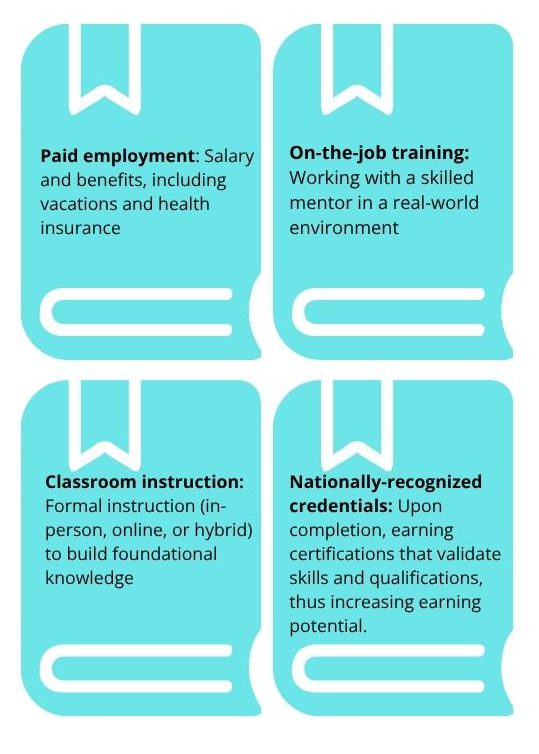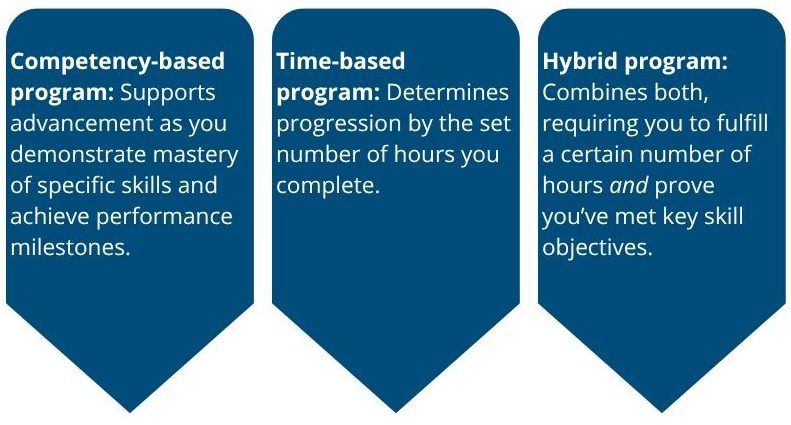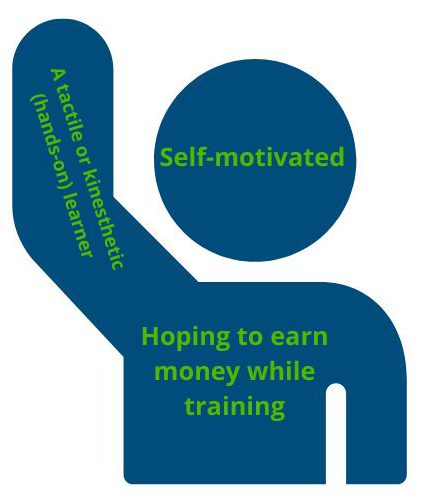
Apprenticeships: Earn while you learn and master a skill
Posted by
People have learned a craft through hands-on experience for centuries. Apprenticeships offer a system of training new generations of practitioners in a trade or profession. The earliest civilizations — ancient Egypt, Mesopotamia, Greece, and Rome — used apprenticeships to train their artisans, scribes, and engineers.
A (brief) history of apprenticeships
Medieval Europe implemented a guild system, and with the emergence of these craft guilds, generations of stonemasons, blacksmiths, weavers, and other trades learned from their masters. The guilds ensured that people trained, worked, and promoted at the appropriate level. Apprentices lived with their masters and learned the basics. They earned little (if any) pay as they began developing their skills. Once their apprenticeship ended, they’d become journeymen, traveling and working in various towns and workshops to gain experience and earn a living. Eventually, they became masters who might own their own workshops and train apprentices.
The Industrial Revolution marked a shift from craft-based to factory-based production; the traditional guild system declined. Specialized, repetitive tasks became the norm. By the early 20th century, factories began introducing vestibule schools. They emerged as a response to the limitations of traditional on-the-job training and apprenticeships. Vestibule training gained prominence during times of high demand for skilled labor, such as during World War I and World War II, when thousands of workers needed rapid training to fill factory roles.
While the idea of living with a master and being paid in food and lodging remains in the past, the concept of apprenticeships is very much alive today. 21st-century apprenticeships remain valuable for helping potential tradespeople develop the skills and experience needed for a successful career.
What is an apprenticeship?
An apprenticeship is a structured training program blending practical work experience with theoretical knowledge. It’s more formal than an internship. Apprentices are employed, earning a salary and benefits, while working with and learning from experienced professionals.
Unlike internships, which typically last a few months or a semester, apprenticeship programs can last a year or longer. Apprentices also spend a good chunk of their time in class working toward earning specific certifications or credentials upon completing their program. These comprehensive training programs include:

How apprenticeships work
Apprenticeships are structured training programs that pay a salary while you learn on the job and work toward a recognized certification. Program lengths vary by industry and occupation, typically ranging from one to six years.
Generally, these programs follow one of three structures.

Employers, labor unions, and professional associations regulate and support apprenticeships to ensure training and expertise meet high standards. Some companies offer their own in-house training, while others may cover the cost for you to attend classes at a community college or technical school.
An apprenticeship may blend classroom instruction, on-the-job training, and supervised independent work. A key part of the process involves working closely with a mentor, where you complete tasks under their supervision and guidance until you’re ready to work independently.
Employers also benefit from apprenticeship programs. They gain the ability to train and shape a workforce that meets specific business needs. Apprentices contribute to the company’s output while learning. Those who complete apprenticeship programs often exhibit greater loyalty to their employer. Apprenticeship programs allow companies to develop talent from within, potentially reducing the need for external hiring.
Benefits of apprenticeships
Apprenticeships offer numerous advantages for both apprentices and their employers, and they’re available in a wide range of fields, including traditional trades (e.g., carpentry, electrical, plumbing) and emerging sectors such as healthcare, IT, and green energy.
Apprentices can earn while they learn, gaining skills and experience without accumulating student loan debt. They acquire practical, job-specific skills directly relevant to their chosen career. They earn nationally-recognized certifications and credentials that employers widely accept.
Apprenticeships often lead to full-time employment and higher earning potential. You can earn significantly more throughout your career compared to those without specialized training. These partnerships allow you to connect with other industry professionals and mentors.
Employers also benefit from apprenticeship programs. They gain the ability to train and shape a workforce that meets specific business needs. Apprentices contribute to the company’s output while learning. Those who complete apprenticeship programs often exhibit greater loyalty to their employer. Apprenticeship programs allow companies to develop talent from within, potentially reducing the need for external hiring.
Key differences from other training
Unlike internships, which are often short-term and less structured, apprenticeships involve a longer-term commitment, lead to formal qualifications, and emphasize progressive skill development under consistent mentorship. They also differ from traditional college degrees by integrating paid work experience directly into the learning process, and in some cases, eliminating tuition fees.
Who can apply?
If you’re at least 16, you can start applying for apprenticeships. Some programs have specific entry requirements, including education, age, or prior experience. But many offer pathways for those early in their careers, looking to upskill or seeking a career change.
These programs are a great fit if you’re:

Typically, those who pursue an apprenticeship are pretty self-motivated and have a strong leaning toward a specific career path. Apprentice candidates have done their homework on the role and may have begun exploring ways to show their aptitude for an apprenticeship. In some professions, apprenticeships are the gold standard for training new employees. Other fields may offer aspiring professionals the option to attend a trade school or pursue an apprenticeship.
Interested in a skilled trade? Apprenticing in that area might be a great strategy.
For more information, explore resources from:
- Apprenticeship.gov
- indeed.com
- U.S. Department of Labor: Apprenticeships
- U.S. Department of Labor: Employment and Training Administration
- What is an apprenticeship? ASVAB Career Exploration Program
Need more inspiration? Check out our Pathways After High School guide, too!
Blog Categories
- Career Advice
- College Admissions
- Colleges & Universities
- Financial Aid and Scholarships
- For Counselors
- For Parents
- For Students
- Gap Years
- Mental Health and Wellness
- Online Learning
- Performing and Visual Arts
- STEM Majors and More
- Summer Programs
- Teen Volunteering
- Trade & Vocational Schools
- Tutoring & Test Prep

Organization with listings on TeenLife? Login here
Register for Free
We’re here to help you find your best-fit teen-centered academic and enrichment opportunities.
Forgot Password
"*" indicates required fields








